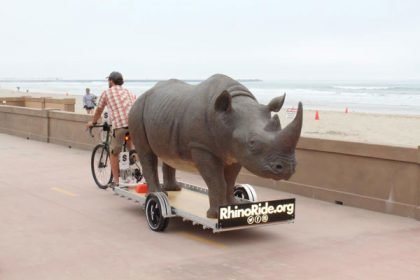 Matt Meyer takes his bike out for a spin, rhino in tow. Photo courtesy of rhinoride.org.
Matt Meyer takes his bike out for a spin, rhino in tow. Photo courtesy of rhinoride.org.
By Stefanie Donahue
It’s been nearly two years in the making, but in just a few weeks, South African activist Matt Meyer will embark on an approximately 2,000-mile bike ride from Blaine to San Diego in an effort to educate communities about the impacts of poaching on the declining rhino population.
An homage to Nelson Mandela’s “Long Walk to Freedom,” Meyer’s “Long Ride to Free Them” will begin at Peace Arch Park on Monday, April 17. But before he takes off, Meyer will harness a 350-pound trailer fixed with a life-size fiberglass replica of a rhino to the back of his bike to make things a bit more interesting.
Meyer lives in South Africa, where he was born and raised. After graduating college in 2007, he got a job on a game reserve as a safari guide and hasn’t looked back since.
“Guiding became my passion,” he said. “I fell in love with tourism.”
He’s now a private guide and partners with local guides to lead tours in locations throughout south and east Africa. Looking back, Meyer said he considers his work in the “raw, unforgiving, beautifully spectacular wild” as the ignition that sparked his early passion for wildlife, particularly rhino.
“I’ve just always had this bond to rhinos,” he said. “It’s really reverberated with me throughout my life.”
Meyer’s admiration for the species set the foundation for his role as an activist. He vividly remembers the first time he encountered a dead rhino that had been poached for its horn. It’s a sight he’ll never forget, he said.
According to statistics from the International Rhino Foundation, an estimated 29,000 rhinos survive in the wild today – of the five remaining species, three are critically endangered. Poachers trade rhino horns on the black market. Made of keratin, some believe the horns cure ailments, and they are also considered a status symbol. Just last year, nearly 1,200 rhinos were poached and killed in South Africa alone, according to the foundation.
With this in mind, Meyer felt the need to take action, so he developed the concept for the “Long Ride to Free Them” bike ride with friend Chris Liebenberg of San Diego-based Piper & Heath Travel. After realizing he couldn’t legally pull the fiberglass rhino through the streets of California on foot, Meyer decided to hitch it to a bike and expand the mileage to locations throughout the West Coast.
The primary goal is to educate communities about the declining rhino population, Meyer said. He also hopes to gather donations for charities that specialize in rhino conservation and care.
Project co-sponsors Piper & Heath Travel and Wilderness Safaris have committed to covering all of Meyer’s travel expenses so all donations are directed toward African-based charities Care for Wild Africa, Save the Rhino Trust and Ol Pejeta Conservancy.
“The ethos that we’ve carried with us through the whole project is that all the money will go back to the cause,” Meyer said. “None of the costs of the project are being paid by the donors.”
So far, the team has raised $16,911 toward their $250,000 goal.
At the pace of 40 miles per day, Meyer plans to make multiple stops along the way. He expects to arrive in San Diego on June 16 and will auction off the fiberglass rhino replica on June 24.
A videographer will join Meyer on the trip to document and post to social media on Facebook @RhinoRide2017, on Twitter @RhinoRide2017 and on Instagram @RhinoRide2017.
Meyer will be available to meet with the public at Peace Arch Park from 4 to 5 p.m. on April 16 and is slated to leave town between 7 and 8 a.m. on April 17. To learn more, visit rhinoride.org.
Comments
No comments on this item Please log in to comment by clicking here